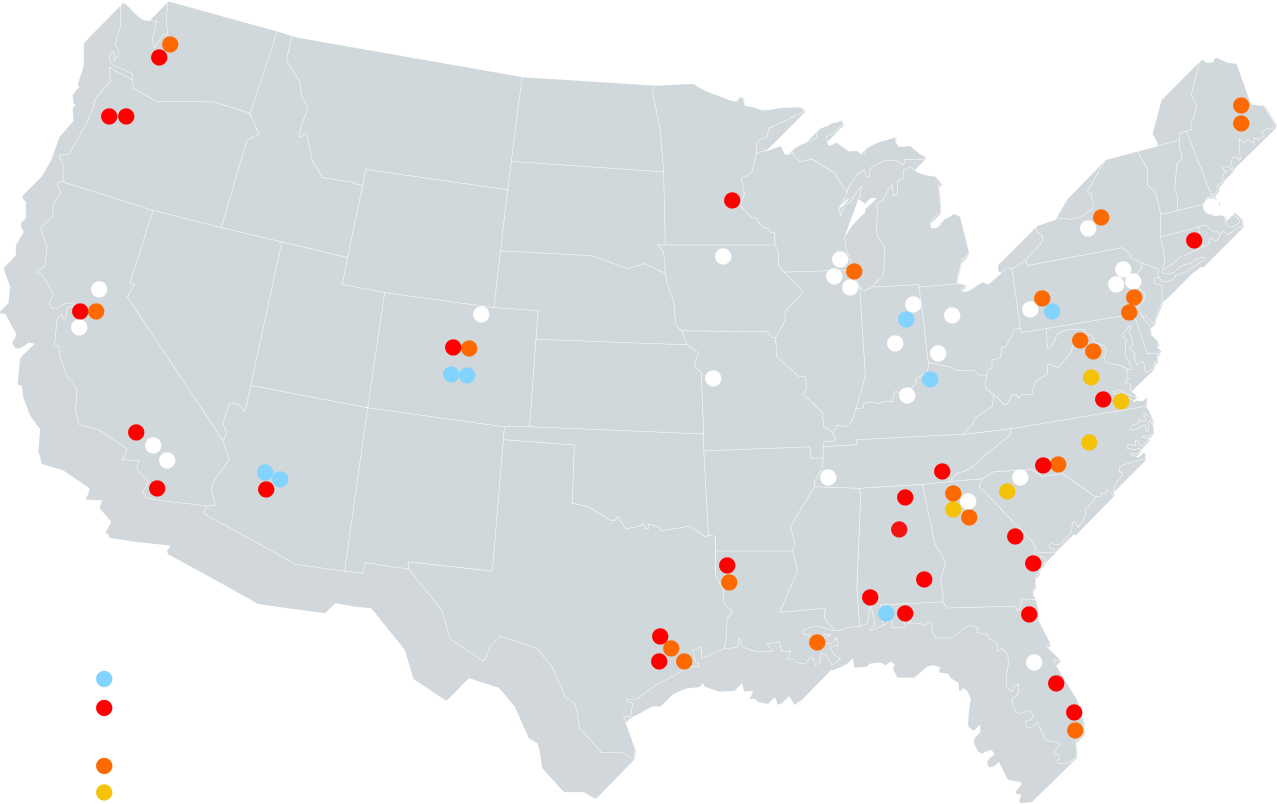The Importance of Solar Testing
Applied Technical Services performs VDA 230-219 testing to determine whether clients’ automotive samples display the required degree of resistance to solar radiation. A variety of stimuli can cause a material or component used in an automotive product to fail prematurely and unexpectedly, such as heavy impacts, water damage, and the like. While perhaps counterintuitive to the layperson, OEMs and their parts suppliers know they must also consider how extended exposure to the sun may impact materials.
Over time, interior and exterior materials can see their performance characteristics undermined by conditions endemic to sun exposure, including heat and the solar spectrum of electromagnetic radiation — namely visible light, infrared (IR) waves, and ultraviolet (UV) waves. These stimuli, especially when combined with other environmental factors characteristic to outdoor service environments such as cycles of humidity and variations in temperature, can contribute to several types of material failures and degradation, including:
- Color Fading
- Loss of Gloss
- Molecular Degradation
- Delamination
- Structural Distortion
- Loss of Strength
- Reduced Ductility
- Cracking
- Chalking
- Embrittlement
OEMs and parts suppliers send their automotive design materials and components to solar testing laboratories like ATS to ensure their samples meet client standards for resistance to sunlight exposure. We determine these characteristics by performing solar simulation testing to VDA 230-219.
How the Method Works
Solar testing requires subjecting a sample to conditions that replicate the sunlight it would experience in its intended service environment. Depending on the scope of analysis, the testing specifications may require different cycles or ranges of exposure, but all solar testing has certain commonalities: technicians carefully apply a combination of heat and solar radiation to simulate years of sunlight exposure over a course of days or weeks. VDA 230-219 specifically applies to automotive components: both interior and exterior. Thus, solar radiation testing per this specification falls under ATS’ talented automotive testing division. Their access to our walk-in solar simulation chamber, 10ft × 10ft × 8ft, allows them to accommodate larger samples for analysis. Furthermore, its size lets us use accessories that enable technicians to administer either direct sunlight or indirect solar radiation — the latter simulating sunlight through a windshield. We regularly perform solar simulation testing to other recognized standards (i.e., DIN 75220, MBN 55555-5, and MIL-STD 810G Method 505.5) as well as custom client specifications. Our Marietta lab, where we conduct this method of analysis, maintains an ISO/IEC 17025:2017 accreditation through the A2LA to perform this method of testing to DIN 75220.
About ATS
Since our founding in as a small consulting engineering group 1967, Applied Technical Services has continually expanded its capabilities to now include world-class testing, inspection, training, calibrations, and forensic investigations. We owe our growth over the last 50+ years to the dedication and expertise of our valued employees — now over 1,000 strong and eager to serve ATS clients operating in countries around the globe. Although we routinely serve other industries, our capacity as a VDA 230-219 testing provider exclusively benefits our automotive clients.
Our Commitment to Quality
ATS performs all solar testing in-house under the scope of our ISO 9001:2015 registered quality assurance program. We maintain a regular auditing schedule, wherein ISO-approved inspectors reassess our business procedures from top to bottom to ensure that our system continues to comply with the internationally recognized standard on effective quality management practices. Our Marietta lab has maintained uninterrupted certified status since initially gaining recognition in 1998. ATS chooses to maintain this rigorous standard of excellence because we insist on holding ourselves accountable for the quality of our services, and we want our clients to know it.
We uphold several policies to ensure our customers receive the most positive experience working with us. First, we pledge that our testing professionals will return clear, accurate, and detailed reporting within a short turnaround window. We understand that clients need our timely insight to make informed decisions regarding their samples, and so we take great pains to not hold up their process. Second, we empower our customer service representatives to act as ambassadors on behalf of clients reaching out with questions. These client relationship specialists facilitate contact with the most relevant staff member to help them get useful answers. Finally, lab personnel stay accessible to clients coming to them with questions regarding either the status or results of their testing. By remaining responsive to their needs and engaged while helping to secure a solution to their problem, we give clients a reason to work with us again and again. If your company needs solar radiation testing according to VDA 230-219, contact ATS today — We take a closer look.



